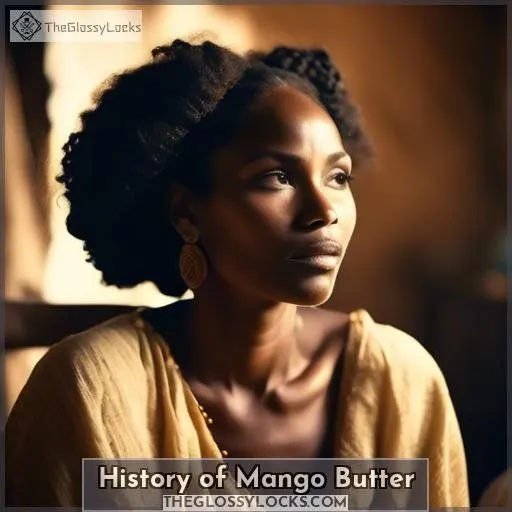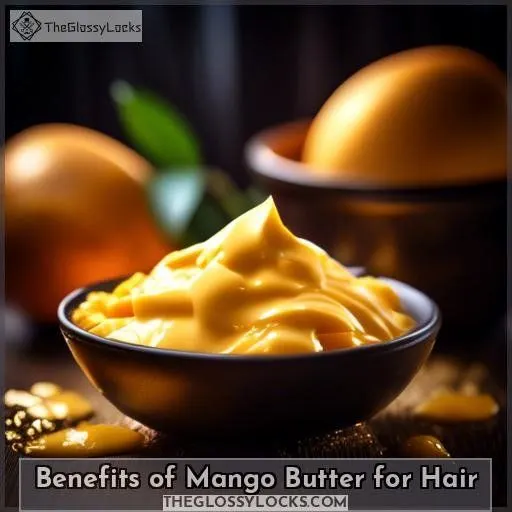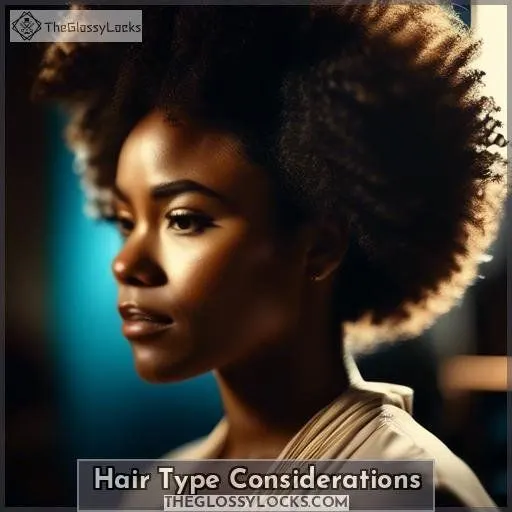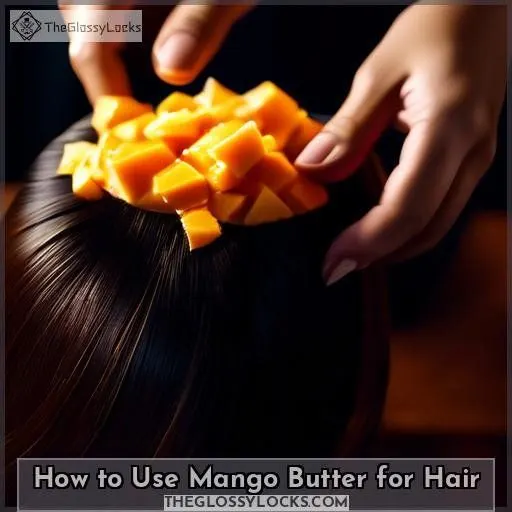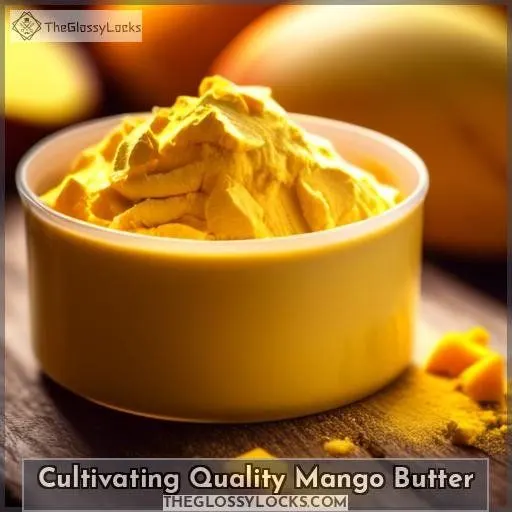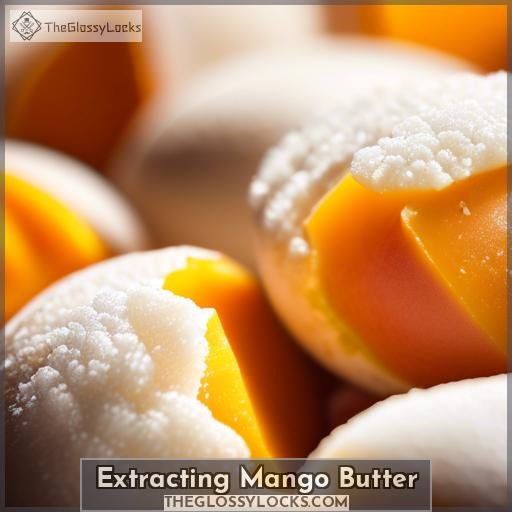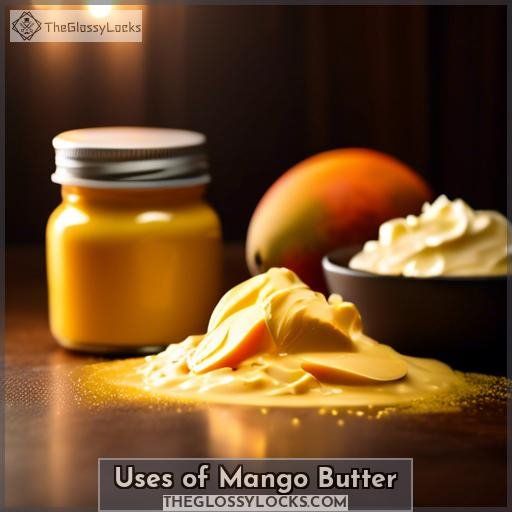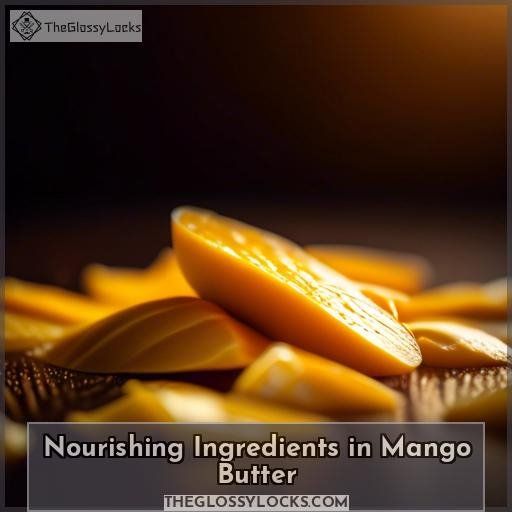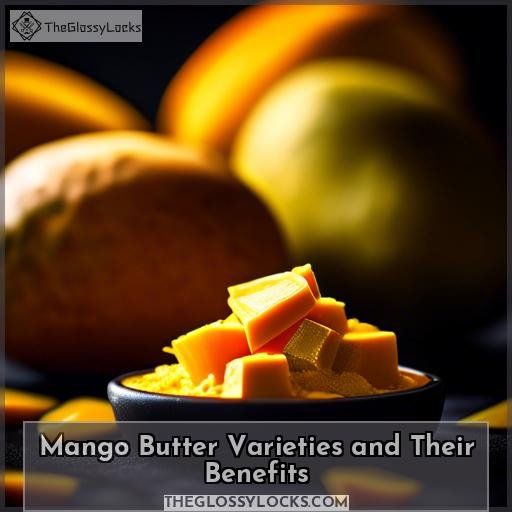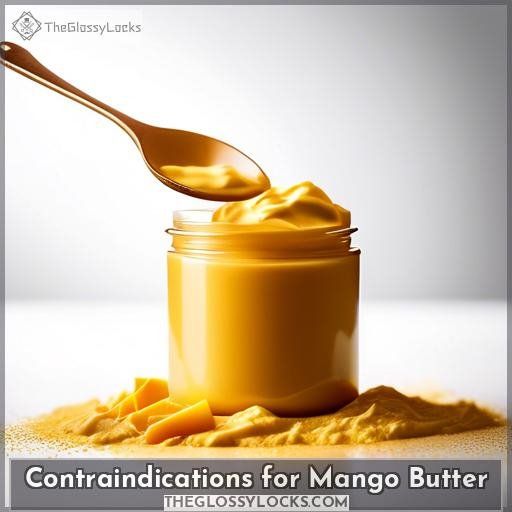This site is supported by our readers. We may earn a commission, at no cost to you, if you purchase through links.
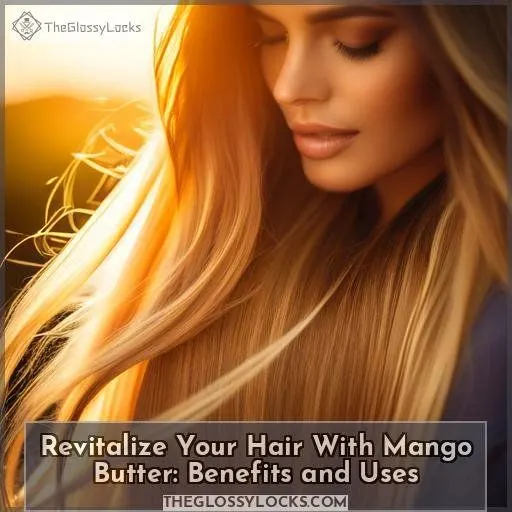
Revitalize your hair with the nourishing benefits of mango butter! This versatile ingredient soothes the scalp, hydrates strands, and prevents split ends.
When using mango butter for hair, consider your hair type. Apply it as a pre-shampoo treatment for thin hair, work it into soaking wet low-porosity hair, or use it to protect color-treated locks.
Blend mango butter into hair masks, shampoos, and conditioners for all-over moisture. Cultivated in ideal tropical climates, quality mango butter is unrefined and cold-pressed for maximum benefits.
Discover how this natural wonder can transform the health and appearance of your hair.
Table Of Contents
- Key Takeaways
- History of Mango Butter
- Benefits of Mango Butter for Hair
- Hair Type Considerations
- How to Use Mango Butter for Hair
- Cultivating Quality Mango Butter
- Extracting Mango Butter
- Uses of Mango Butter
- Nourishing Ingredients in Mango Butter
- Mango Butter Varieties and Their Benefits
- Contraindications for Mango Butter
- Frequently Asked Questions (FAQs)
- How long does it take to see results from using mango butter for hair?
- Can mango butter be used on colored hair?
- How does mango butter compare to other hair care ingredients, such as coconut oil or shea butter?
- Are there any potential side effects or risks associated with using mango butter for hair?
- Can mango butter be used on hair extensions or wigs?
- Conclusion
Key Takeaways
- Mango butter, derived from the kernel of the mango fruit, has been used in traditional medicine and cosmetics for centuries due to its moisturizing and emollient properties.
- Mango butter is rich in vitamins A and E, antioxidants, and essential fatty acids, which help nourish and protect the scalp and hair follicles.
- Mango butter can be used in various ways for hair care, such as a pre-shampoo treatment, a hair mask, or added to shampoo or conditioner.
- Mango butter is beneficial for different hair types, including thin hair, low-porosity hair, and color-treated hair, and can help prevent split ends, reduce scalp itchiness and dandruff, and protect hair from fading and heat damage.
History of Mango Butter
Mango butter, derived from the kernel of the mango fruit, has a rich history that spans over 4,000 years. Originating in India, it has been used in traditional medicine and cosmetics for centuries.
The mango tree, scientifically known as Mangifera indica, is a large tropical evergreen that can grow up to 100 feet tall. The tree is cultivated in sandy loam soil with adequate drainage and requires a pH between 5.2 and 7.5 for ideal growth.
Mango butter is extracted from the kernel by hydraulic pressing or solvent extraction, which is then used in hair and skin care products. It’s known for its moisturizing and emollient properties, making it an ideal ingredient for hair care, particularly for hydrating and sealing in moisture.
Benefits of Mango Butter for Hair
Are you looking to revitalize your hair? Mango butter’s nourishing properties can promote scalp health, hydrate your strands, and prevent split ends. Incorporate this versatile ingredient into your hair care routine for a natural boost.
Promotes Scalp Health
Mango butter is a natural, plant-based butter derived from the mango fruit’s seeds. It’s rich in vitamins A and E, antioxidants, and essential fatty acids that help nourish and protect your scalp and hair follicles. Here are three ways mango butter promotes scalp health:
- Nourishes Scalp and Hair Follicles: Mango butter is rich in vitamins and antioxidants that help repair damaged hair and protect hair follicles from future breakage.
- Reduces Scalp Itchiness and Dandruff: The fatty acids in mango butter can help seal in moisture and prevent dryness, which may help prevent dandruff from coming back.
- Soothes Irritation and Itchiness: Mango butter can soothe any itching and irritation you may be experiencing on your scalp, helping to create a healthier scalp environment.
Hydrates Hair
Mango butter is a powerful hydrator for all hair types, including thick hair and low-porosity hair. It moisturizes dry hair, helping it to look and feel healthier. Using mango butter for hair benefits can be as simple as adding it to your shampoo or conditioner, or creating a hair mask with mango butter, olive oil, honey, and essential oil.
Prevents Split Ends
Just as mango butter hydrates your locks, it also offers a shield against split ends. Its emollient properties smooth out frays, giving your hair a sleek, unified look.
- Antioxidant protection seals in moisture and strength.
- Antifungal and antimicrobial properties maintain scalp health.
- Emollient qualities prevent breakage and split ends.
- Hair shaft strengthening for resilient strands.
- Ideal for any hair type, mango butter is a hair mask hero.
Hair Type Considerations
If you have thin or easily weighed-down hair, use mango butter in a deep conditioner. For low-porosity hair, apply mango butter to soaking wet hair to guarantee thorough absorption and hydration.
Thin Hair
Mango butter is a fantastic ingredient for those with thin hair, as it provides nourishment and hydration to the hair follicles, reducing hair fall and promoting hair growth. To use mango butter for thin hair, you can apply it as a leave-in conditioner to the ends of damp hair, or create a hair mask with mango butter, olive oil, honey, and essential oil.
Additionally, you can add mango butter to your shampoo or conditioner for an extra boost of hydration. Mango butter is a natural emollient that keeps moisture inside the hair strands, preventing dryness and frizz.
Low-Porosity Hair
Low-porosity hair can be a challenge regarding moisture retention. But fear not, mango butter is here to help! This versatile ingredient is a game-changer for low-porosity hair. It’s perfect for deep conditioning treatments, as it seals in moisture and provides a protective barrier.
Plus, its antifungal and antimicrobial properties make it a great choice for those with sensitive scalps. And let’s not forget about its benefits for hair growth! So, if you’re looking for a natural way to boost your hair’s health, mango butter is your new best friend.
Color-Treated Hair
Color-treated hair requires extra protection from the elements to maintain its vibrancy and prevent fading. Mango butter, with its rich antioxidant content, is an excellent choice for safeguarding your color-treated locks. Here’s how you can use mango butter to enhance your hair’s appearance:
- UV Protection: Mango butter contains antioxidants that act as a protective shield for your hair, defending against UV radiation and pollution. This helps to prevent color fading and maintain your hair’s vibrancy.
- Heat Protection: When styling your color-treated hair, heat can cause damage and lead to color loss. Mango butter can be used as a barrier between your hair and heat styling tools, reducing the risk of damage and preserving your color.
- Fade Prevention: Regular use of mango butter can help slow down the appearance of split ends and gray hair, which are often associated with the presence of free radicals that can cause color fading. By using mango butter, you can extend the life of your color-treated hair.
To incorporate mango butter into your hair care routine, consider the following options:
- Pre-shampoo Treatment: Apply a small amount of mango butter to your hair before shampooing to provide an extra layer of protection.
- Hair Mask: Mix mango butter with other nourishing ingredients like olive oil and honey to create a deep conditioning hair mask. Apply the mask to your hair, focusing on the ends, and leave it on for 15-20 minutes before rinsing.
- Add to Shampoo or Conditioner: Incorporate a small amount of mango butter into your shampoo or conditioner for added protection and moisture.
How to Use Mango Butter for Hair
Give your hair a burst of nourishment with mango butter. Try it as a pre-shampoo treatment, incorporate it into hair masks, or mix it right into your shampoo or conditioner.
Pre-shampoo Treatment
Pre-shampoo treatment with mango butter is a game-changer for your hair. Apply it overnight, and you’ll wake up with a scalp massage that promotes hair growth. You can also use it as a hair growth serum or a deep conditioner. For an extra boost, try our 2-column, 5-row table of pre-shampoo treatment recipes with mango butter.
Hair Mask Recipes
Unleash mango butter’s enchantment for radiant tresses with these hair mask concoctions:
- Blend mango butter, olive oil, and honey for a mask that fosters hair growth and scalp nourishment.
- Combine with essential oils; apply weekly to combat hair loss and enhance hair resilience.
- Whisk in a ripe avocado for amplified hair brilliance, allowing your locks to imbibe the sustenance.
Adding to Shampoo or Conditioner
Adding mango butter to your shampoo or conditioner can be a game-changer for your hair. This natural ingredient is rich in fatty acids and vitamins that can help nourish and moisturize your hair, leaving it looking and feeling healthy. Here’s a simple way to incorporate mango butter into your hair care routine:
- Melt the butter: Begin by melting a small amount of mango butter in a double boiler or by warming it gently in a heat-safe container.
- Add it to your shampoo or conditioner: Once the butter is melted, you can add it directly to your shampoo or conditioner. This will help distribute the butter evenly throughout your hair, ensuring that each strand receives the benefits.
- Mix well: Stir the butter into your shampoo or conditioner until it’s well combined.
- Use as usual: After mixing, you can use your shampoo or conditioner as you normally would. The mango butter will help to moisturize your hair and scalp, leaving it feeling soft and healthy.
Cultivating Quality Mango Butter
To cultivate quality mango butter, you’ll need to guarantee the right soil and climate conditions. Mango trees flourish in sandy loam soil with good drainage and a pH between 5.2 and 7.5, and can be propagated through techniques like chip budding, approach grafting, and veneer grafting.
Soil and Climate Requirements
Mango butter is a luxurious and versatile ingredient that can be used for various purposes, including hair care. It comes from the kernel of the mango fruit and is rich in nutrients like vitamins A, C, and E, as well as essential fatty acids. Mango butter is known for its moisturizing properties, which make it an excellent choice for sealing in moisture and providing hair hold. It also softens hair and adds shine, helping to retain moisture throughout the week.
When it comes to using mango butter for hair, there are several ways to incorporate it into your routine. You can use it as a pre-shampoo treatment, add it to your shampoo or conditioner, or create a hair mask with mango butter, olive oil, honey, and essential oil. For a deep conditioning experience, you can mix mango butter with other nourishing ingredients like almond oil, grapeseed oil, and virgin coconut oil, then apply the mixture to your hair before shampooing.
Mango butter is also beneficial for different hair types. For thin or easily weighed-down hair, it can be used in a deep conditioner. It’s ideal for all hair types and can be applied to soaking wet hair for low-porosity hair. It also protects color-treated hair from fading and heat damage.
In addition to its benefits for hair, mango butter is also known for its skin care properties. It’s rich in antioxidants and can help protect the skin from environmental stressors, soothe dry and eczema-prone skin, and promote skin repair. Mango butter is also used in various body care products, including lotions, creams, gels, ointments, soaps, lip balms, lipsticks, sun care, foot care, shampoos, conditioners, and hair care products.
When using mango butter for hair, it’s important to think about the quality of the butter you’re using. Look for high-quality, unrefined mango butter that has been cold-pressed or expeller-pressed to keep its nutrients and benefits.
Propagation Techniques
To cultivate quality mango butter, you can use propagation techniques such as chip budding, approach grafting, and veneer grafting. These methods help to grow healthy mango trees that will produce high-quality fruit.
Chip budding involves taking a bud from a mature tree and grafting it onto a young tree. Approach grafting involves making a slit in the bark of the young tree and inserting a bud from the mature tree. Veneer grafting involves taking a thin slice of bark with a bud from the mature tree and attaching it to the young tree.
These methods can be used in different climates and soil types, but the ideal conditions for mango cultivation are frost-free, cool, and dry winters, and steamy hot summers, with a pH between 5.2 and 7.5 for best growth.
Extracting Mango Butter
Mango butter can be extracted through either expeller- or cold-pressing the de-shelled mango fruit seeds. Solvent extraction may also be used, resulting in a rich, creamy consistency that’s solid at room temperature.
Expeller- or Cold-Pressing
To extract mango butter, two primary methods are commonly used: expeller pressing and solvent extraction. Both methods have their advantages and disadvantages, which can influence the quality and price of the final product.
Expeller pressing involves using a hydraulic press to apply high pressure and friction to the mango seeds, causing the oil to seep out through small openings at the bottom of the pressing barrel. This method is considered cold pressed as it doesn’t heat the seeds before extraction. Expeller pressing removes about 87-95% of the oil from the seeds, making it the second most efficient method of extraction. However, it can heat up to above 140°F during the process, which technically makes it not cold processed. Expeller pressed oils can also be refined, bleached, and deodorized (RBD) and/or winterized to remove impurities and increase the oil’s shelf life.
On the other hand, solvent extraction uses a solvent like hexane or ethanol to wash the mango seeds, releasing the oil. The solvent is then evaporated, leaving the oil behind. Solvent extraction removes about 97-99% of the oil from the seeds, making it the most efficient method of extraction. However, it can leave microscopic residues of the solvent in the oil, which may require further refining and purification steps.
The choice between expeller pressing and solvent extraction depends on the desired quality, cost, and availability of the mango seeds. Both methods have their own advantages and disadvantages, and the best choice depends on the specific application and the desired properties of the final product.
Solvent Extraction Method
Delve into the realm of solvent extraction, a technique that safeguards the excellence of your mango butter. Here’s the lowdown:
- Seed screening holds paramount importance; only the select seeds qualify.
- Solvent extraction liberates every iota of goodness.
- Quality assurance measures are indispensable; only the elite pass muster.
- Processing variables are meticulously calibrated for optimality.
- Storage protocols serve as the crowning glory, preserving the freshness of your butter.
Uses of Mango Butter
Mango butter has a wide range of applications in hair care, from nourishing hair masks to moisturizing conditioners and shampoos. You can create a leave-in conditioner by mixing mango butter with essential oils and applying it to your hair after washing.
For a deep conditioning treatment, melt mango butter and mix it with other natural ingredients like olive oil and honey.
You can also add mango butter to your shampoo or conditioner to enhance its moisturizing properties. Mango butter hair moisturizer is an excellent choice for those with dry or damaged hair, providing a protective layer that locks in moisture and promotes hair growth.
Nourishing Ingredients in Mango Butter
Mango butter is a nourishing ingredient that offers several benefits for hair health. Here are three key aspects of mango butter that make it a must-have for your hair care routine:
- Antioxidant Properties: Mango butter is rich in antioxidants, which help protect your hair from environmental stressors and promote hair growth by reducing breakage.
- Antibacterial and Anti-inflammatory Properties: The antibacterial and anti-inflammatory properties of mango butter help soothe an irritated scalp and prevent dandruff, promoting a healthy scalp environment.
- Hair Elasticity and Hydration: Mango butter is a natural emollient that deeply hydrates your hair, improving its elasticity and preventing split ends.
Incorporate mango butter into your hair care routine to experience these benefits and revitalize your hair.
Mango Butter Varieties and Their Benefits
Are you curious about the different varieties of mango butter and how they can benefit your hair? Explore the unique properties and hair care uses of these versatile butter alternatives.
Mango Butter Varieties
Mango butter is a versatile ingredient that can be used in various mango butter recipes and as a substitute for other butters in hair care products. It’s derived from the seeds of the mango fruit and has a creamy, rich texture that melts on contact with the skin. There are different varieties of mango butter, each with its unique benefits for hair. For instance, refined mango butter is known for its light and non-greasy texture, making it suitable for all skin types.
When it comes to purchasing mango butter, you can find it from various brands and suppliers. For example, Shay and Company offers both organic and ultra-refined mango butter, which can be used in a variety of hair care products. However, it’s important to be mindful of potential allergies, as mango butter belongs to the same plant family as poison oak, poison ivy, and poison sumac. If you have a mango allergy, it’s essential to consult with your physician before using mango butter or any mango-based products.
Mango butter is also harvested from mango trees, which are grown in various countries, including India, Brazil, and Indonesia. The best method of harvesting is by handpicking the fruits to avoid damaging their stems and causing the production of milky sap. The extraction process usually involves expeller- or cold-pressing the mango fruit seeds to obtain the butter.
Benefits for Hair
Mango butter is a versatile ingredient that offers numerous benefits for your hair. Here are four ways it can enhance your hair care routine:
- Anti-inflammatory properties: Mango butter soothes the scalp, reducing inflammation and promoting a healthy environment for hair growth.
- Promotes hair growth: Rich in essential fatty acids and vitamins, mango butter nourishes the scalp and stimulates hair follicles, encouraging new growth.
- Reduces breakage: The butter’s strengthening properties help to prevent split ends and breakage, keeping your hair healthy and strong.
- Adds shine: Mango butter’s ability to seal in moisture and protect hair from environmental stressors gives your hair a radiant, glossy appearance.
Uses in Hair Care
Immerse yourself in the realm of mango butter, the newfound ally for your tresses. This multifaceted wonder not merely stimulates hair growth and prevents breakage, but also shields your hair’s hue with its nurturing caress.
Whether you’re grooming or preserving, infusing mango butter into your hair care regimen is akin to bestowing your locks with a lavish spa experience—a symphony of hydration and protection.
Contraindications for Mango Butter
Mango butter, a natural ingredient extracted from the seeds of the mango fruit, provides numerous benefits for hair health. It’s abundant in essential fatty acids, vitamins, and antioxidants that contribute to hydrating, reinforcing, and shielding hair. However, similar to any ingredient, it’s crucial to take into account possible adverse effects.
One potential concern with mango butter is its compatibility with certain skin types. Individuals with oily skin may experience blocked pores when using mango butter, as it’s rich in oils. To address this issue, it’s advised to apply mango butter only to the tips of the hair or utilize an exfoliating apple cider vinegar rinse if irritation occurs.
Another factor to be aware of is the extraction process of mango butter. While it’s typically deemed sustainable, some conventionally produced mango butter may be extracted using chemical solvents such as hexane. To guarantee the most eco-friendly and pure product, opt for 100% organic and cold-pressed mango butter.
Frequently Asked Questions (FAQs)
How long does it take to see results from using mango butter for hair?
You’ll likely see results from using mango butter in as little as a week. It deeply nourishes and hydrates hair, minimizing breakage and promoting healthier, stronger strands over time.
Can mango butter be used on colored hair?
Mango butter is color-safe and won’t strip or fade your vibrant hues. In fact, it’ll protect your hair color while deeply nourishing and softening strands. Go ahead, color away – mango butter’s got your back!
How does mango butter compare to other hair care ingredients, such as coconut oil or shea butter?
Mango butter boasts bountiful benefits, bolstering both hair health and hair happiness. Compared to coconut oil’s conditioning caress or shea butter’s silky softness, mango butter marvelously melds moisture and manageability for your mane.
Are there any potential side effects or risks associated with using mango butter for hair?
Mango butter is generally well-tolerated, but patch test first as it may cause allergic reactions in some. Avoid use if you have a known mango allergy. Otherwise, it’s a gentle, nourishing option for most hair types.
Can mango butter be used on hair extensions or wigs?
Mango butter is the Swiss Army knife of hair care – it seamlessly blends into extensions and wigs, nourishing and protecting strands like a trusty sidekick. Embrace its versatile magic for healthy, vibrant locks, no matter the style.
Conclusion
Absolutely astounding! Mango butter is a true marvel for revitalizing your hair. Whether you have thin, low-porosity, or color-treated tresses, using mango butter can transform your locks.
With its nourishing properties and versatile applications, mango butter is a must-have for anyone seeking to revive their hair. Blend it into masks and conditioners for all-over hydration, or use it as a pre-shampoo treatment to soothe your scalp. Unleash the full potential of your hair with the power of mango butter!

